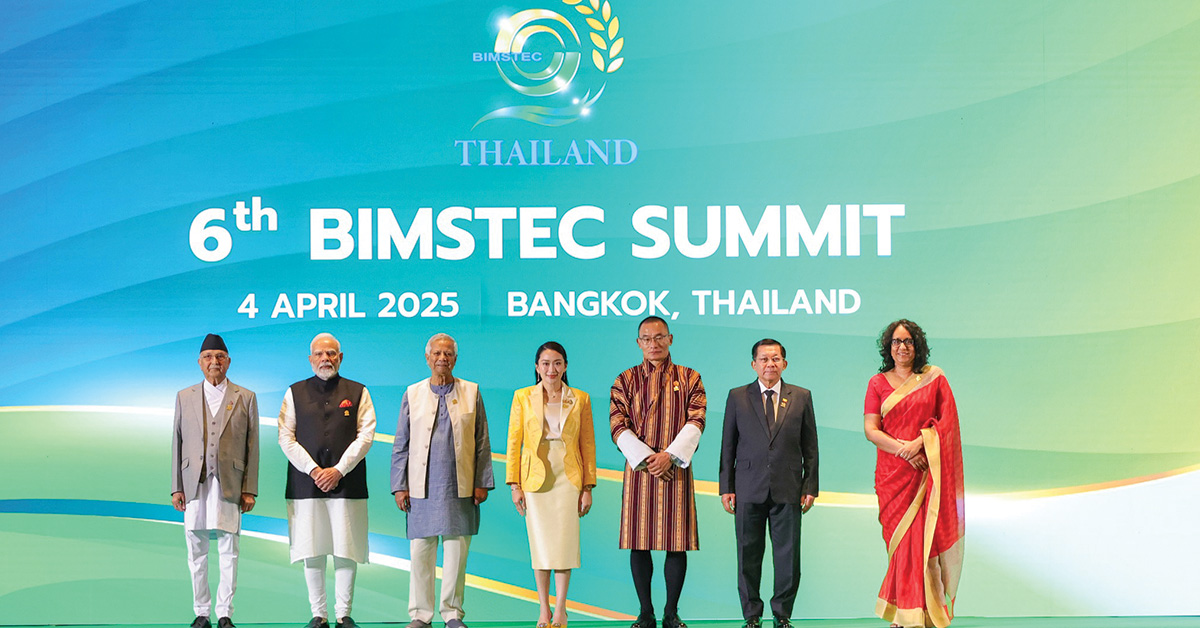

 22.44°C काठमाडौं
22.44°C काठमाडौं

Amid recent earthquakes in Myanmar and Thailand, the 6th Summit of the Heads of Government of the Bay of Bengal Initiative for Multi-Sectoral Technical and Economic Cooperation (BIMSTEC) concluded successfully in Bangkok. The Summit was held on April 4, 2025. Held under the theme “Prosperous, Resilient, and Open BIMSTEC,” the summit focused on promoting collaboration among the member States to address shared security and developmental challenges.
The summit was attended by Muhammad Yunus, Chief Adviser of Bangladesh; Dasho Tshering Tobgay, Prime Minister Bhutan; Narendra Modi, Prime Minister of India; Min Aung Hlaing, Prime Minister of Myanmar; KP Sharma Oli, Prime Minister of Nepal; Harini Amarasuriya, Prime Minister of Sri Lanka; and Paetongtarn Shinawatra, Prime Minister of Thailand.
According to the BIMSTEC Secretariat, the summit addressed the challenges facing the Bay of Bengal region, and resulted in the adoption of some key cooperation strategies to strengthen regional integration.
Firstly, the declaration of the 6th BIMSTEC Summit was adopted, stating, “The declaration reflects the vision of the leaders of member countries as well as their decisions and directives for future cooperation.”
Secondly, the summit ratified the first-ever vision document of BIMSTEC, BIMSTEC Bangkok Vision 2030. This landmark document provides a comprehensive and practical roadmap for future cooperation amongst the member States to achieve the vision of a prosperous, resilient, and open BIMSTEC.
Subsequently, the third major outcome of the summit was the signing of the Agreement on Maritime Transport Cooperation by the Foreign Ministers of member states. The Agreement is aimed at enhancing port efficiency, harmonizing maritime policies, and streamlining customs procedures, ensuring smoother movement of goods and services.
Following this, two memoranda of understanding were signed by BIMSTEC member states. The first MoU was signed with the Indian Ocean Rim Association (IORA), institutionalizing future partnership. The other MoU was signed with the United Nations Office on Drugs and Crime (UNODC), formalizing a partnership between UNODC and BIMSTEC in areas of shared priorities.
The fifth agreement ensured the adoption of the Rules of Procedure for the BIMSTEC Mechanisms. As per the BIMSTEC secretariat, the Rules of Procedure, together with the BIMSTEC Charter, lay a strong foundation for the institutional framework for regional cooperation under BIMSTEC.
The sixth key development was the adoption of The Report of the Eminent Persons Group on the Future Direction of BIMSTEC, which includes several recommendations to reform and revitalize BIMSTEC.
Lastly, the BIMSTEC leaders’ joint statement on the impact of the earthquake that struck Myanmar and Thailand was endorsed. According to BIMSTEC, the leaders expressed condolences, solidarity, and a commitment to supporting the affected countries. The statement also reaffirmed their commitment to collaborating on regional disaster management and strengthening response mechanisms.
The BIMSTEC secretariat also reported that the leaders identified key priority areas for regional cooperation, presenting specific proposals and initiatives aimed at advancing progress in intra-regional trade and investment, connectivity, tourism, and culture exchanges. They also highlighted the importance of expanding cooperation to crucial areas such as climate action, green and renewable energy, sustainable agriculture, food security, disaster management, and security.
BIMSTEC Secretary General Indra Mani Pandey outlined the progress made since the 5th Summit held in Colombo in March 2022. He sought guidance from the leaders of member nations to further advance the BIMSTEC agenda and reaffirmed the Secretariat’s commitment to working closely with the member States to strengthen regional cooperation under the organizational framework.
At the conclusion of the summit, Bangladesh, a founding member of BIMSTEC, assumed the Chairmanship of BIMSTEC. The Chief Adviser of the Interim Government of Bangladesh, Mohammad Yunus, reaffirmed Bangladesh’s commitment to working collaboratively with fellow member states to advance BIMSTEC cooperation.
“Against the backdrop of an increasingly complex and uncertain global political and economic landscape, the 6th BIMSTEC Summit reaffirmed BIMSTEC’s critical role in forging regional cooperation to enable the member States to deal with their shared security and sustainable development challenges,” the BIMSTEC Secretariat stated.
Nepal’s Prime Minister KP Sharma Oli addressed the Summit and reiterated Nepal’s commitment to the BIMSTEC Charter. He highlighted the multifaceted regional and global challenges, including climate change, economic disparities, and geopolitical uncertainties, and stressed the importance of deeper regional collaboration to address these challenges.
“The global order is being redefined. At this defining moment, BIMSTEC must not only navigate the changing tides but also seize the opportunity to reinvigorate our regional cooperation,” he stated. Reflecting on the Summit’s theme, “Prosperous, Resilient, and Open BIMSTEC,” PM Oli noted that these three pillars align with the Sustainable Development Goals and resonate with Nepal’s national vision of “Prosperous Nepal, Happy Nepali.” On the occasion, he extended an invitation to the Heads of BIMSTEC member states to attend the inaugural edition of Sagarmatha Sambaad, to be hosted by Nepal, as a platform for dialogue on environmental and other regional and international challenges.
PM Oli also drew attention to pressing regional and global concerns, including economic inequality, rising economic risks, and political uncertainty. To address these challenges, he underscored the need for enhanced regional cooperation among BIMSTEC member states.